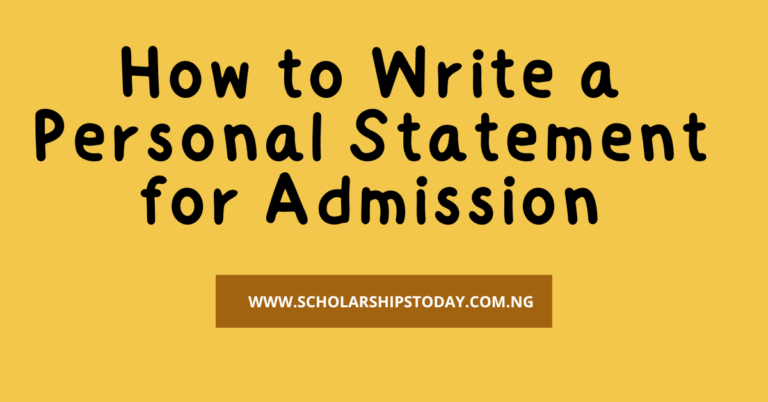How to apply for Chevening scholarship and win the scholarship is very essay. The application process takes a minimum of eight months from the application deadline to when applicants are conditionally selected for an award.
The selection process is lengthy because the organizers work hard to choose only the best candidates for the scholarship program.
Here’s a brief overview of how the application process works.
Assuming you applied for a Chevening scholarship on 12 September 2023 when it opens at 12:00 BST, that’s 12 noon in WAT. By 7 November 12:00 GMT, the application will close.
Then from 8 November applications are sifted against eligibility criteria set by the committee. By Mid-November to December, an independent reading committee takes over all the application to assess and score them.
The scores are thereafter passed to the High Commissions/British Embassies.
Thereafter, the shortlisted candidates will be notified in early to mid February 2024. The process continues until September/October 2024 when the successful applicants will start their study in the UK
The process is quite simple if you follow through diligently and avoid the common mistakes applicants make.
Remember that over 60,000 candidates from over 160 countries apply for this fully funded scholarship to study in the UK.
Not to worry, I’ve covered every information you need to succeed in your application including common errors to avoid, Chevening reference letter samples, Personal statement for Chevening and the Chevening questions and answers. Go through all of them and you’re on your way to winning the scholarship.

How to Apply for Chevening Scholarship
Note that all applications for Chevening scholarship must be done through the organization’s Online Application System (OAS). The process can be started by visiting the Chevening Application portal. But before you submit your application, pay attention to the details below.
To start your application, you’re required to submit your education documents, like a degree certificate, your references and a letter of unconditional admission into a UK university, whether private or public from any of the approved universities.
Below are everything you require.
Step One: Eligibility for the Chevening Scholarship
Eligibility for the Chevening Scholarship involves certain prerequisites.
- Applicants must possess a minimum of two years of work experience.
This is equivalent to 2,800 hours. This can include full-time and part-time employment, voluntary work, paid or unpaid internships, and relevant work completed before, during, or after undergraduate studies.
The work experience requirement doesn’t need to be met through a single period of employment; candidates can submit up to 15 different employment periods to fulfill this criterion.
Current employment need not be relinquished to apply for the scholarship, but communication with employers is advised, ensuring their support if selected.
- Applicants must be citizens of a Chevening-eligible country.
- Applicants must commit to returning to their home country for a minimum of two years after completing the award.
- Have fulfilled the prerequisites for entry into a postgraduate program at a UK university and have been offered an unconditional admission. This means that you must have completed an undergraduate degree program with an equivalent of upper second-class 2:1 honors degree in the UK.
- Candidates must have applied to three eligible UK university courses, secure an unconditional offer for any of the courses.
The scholarship is not open to individuals affiliated with certain British governmental bodies, and exceptions are made for those holding Refugee status in eligible countries.

Note: Having an existing master’s degree does not disqualify you from applying as long as you can properly explain how this particular scholarship will bring positive change to your home country.
Step Two: Chevening Course Selection
You’re allowed to select three different courses. These courses could be from the same school or from three different institutions. By giving you the option to select three courses, it broadens your chances if you’re not awarded for the first course and also gives the assessors the opportunity to have a clearer picture of your ultimate career goals.
When choosing a course, be very careful because there’s no option for you to change it later unless you’re granted permission during the interview process.
And note that before you can be awarded the Chevening scholarship, you must have gained an unconditional offer from the institution you applied to.
To be on the safer side, it’s better to apply for three similar courses at three different institutions. The courses you’ve selected don’t need to be exact, but some kind of similarities should exist between them in content.
Here are further requirements when selecting a course:
- The course you choose must be a full-time course, not part-time and not distance learning.
- It must lead to the award of a master’s degree certification upon completion; that’s a taught master’s, not research-focused MRes programmes.
- The university must be based in the UK and start in the autumn term (usually September/October).
- The course of choice must not be less than nine months or more than 12 months in duration. So, anything above one year is not acceptable.
- The Chevening scholarship centers around Master’s degree programmes, not PhD or DPhil.
Here are three clear and concise pieces of advice for you from Gideon Olanrewaju (Chevening Alumnus: Nigeria, 2017) when you’re selecting your courses.
The very first one is you need to review the module and ensure it aligns with your current learning aspirations, and how it connects with what you currently do and what you seek to do in the future.
The second advice would be for you to understand the elements of the course and how you think it can help the work that you currently do, and how you want to improve on the work that you do back at home either professionally or personally.
The last one would be for you to understand what the course offers you beyond the conventional classroom settings. That is, what are the career opportunities that you can get from the course even after your seminars and your lectures, and what are the further study opportunities that course offers you.
And also, you can think about the professors that are in the department of your study. How well do you think they can support your learning aspirations? That is really really key, and important for you to be able to select the courses that you are about to select before you come to the UK.
Step Three: Reference
Once your application moves to the next stage, you’ll be required to upload two reference letters. You can find winning Chevening Scholarship Reference letter samples. The referees should be people whom you know either through your academic pursuit or professional engagement, as they are more likely to comment on your suitability to receive the scholarship.

Also, before they write the reference letter for you, you might want to share these samples of winning Chevening reference letters to get them familiarized with the best approaches.
Desist from writing the reference yourself or providing false referee contact because the British High Commission/Embassy may contact the referees before moving ahead with you. Now, imagine them calling the number you provide and it’s not reachable or they could not remember you. This is why you should provide referees that you’re well known to.
FAQs on How to Apply for Chevening Scholarship 2024
How Do You Get a Chevening Scholarship?
- Meet eligibility criteria (nationality, degree, work experience).
- Choose 3 eligible UK postgraduate courses and secure an offer from one.
- Demonstrate leadership potential and impact goals in your application.
Are Nigerians Eligible for Chevening Scholarship?
Yes, Nigeria is an eligible country! As long as you’re a Nigerian with a valid means of identification, you’re game for this opportunity.
Which Countries Are Eligible for Chevening?
164 countries are eligible. These countries are: Afghanistan, Albania, Algeria, Angola, Anguilla, Antigua and Barbuda, Argentina, Armenia, Australia, Azerbaijan, Bahamas, Bangladesh, Barbados, Belarus, Belize, Benin, Bermuda, Bhutan, Bolivia, Bosnia and Herzegovina, Botswana, Brazil, British Virgin Islands, Brunei, Burkina Faso, Burundi, Cambodia, Cameroon, Canada, Cape Verde, Central African Republic, Chad, Chile, China, Colombia, Comoros, Cook Islands, Costa Rica, Côte d’Ivoire, Cuba, Democratic Republic of the Congo, Djibouti, Dominica, Dominican Republic, Ecuador, Egypt, El Salvador, Equatorial Guinea, Eritrea, Eswatini, Ethiopia, Falkland Islands, Fiji, Gabon, Gambia, Georgia, Ghana, Grenada, Guatemala, Guinea, Guinea Bissau, Guyana, Haiti, Honduras, Hong Kong, Iceland, India, Indonesia, Iran, Iraq, Israel, Jamaica, Japan, Jordan, Kazakhstan, Kenya, Kiribati, Kosovo, Kyrgyzstan, Laos, Lebanon, Lesotho, Liberia, Libya, Madagascar, Malawi, Malaysia, Maldives, Mali, Marshall Islands, Mauritania, Mauritius, Mexico, Micronesia, Moldova, Mongolia, Montenegro, Montserrat, Morocco, Mozambique, Myanmar, Namibia, Nauru, Nepal, New Zealand, Nicaragua, Niger, Nigeria, North Macedonia, Occupied Palestinian Territories, Pakistan, Palau, Panama, Papua New Guinea, Paraguay, Peru, Philippines, Republic of Congo, Russia, Rwanda, Saint Helena, Ascension, and Tristan da Cunha, Saint Kitts and Nevis, Saint Lucia, Saint Vincent and the Grenadines, Samoa, São Tomé and Principe, Senegal, Serbia, Seychelles, Sierra Leone, Singapore, Solomon Islands, Somalia, South Africa, South Caucasus, South Korea, South Sudan, Sri Lanka, Sudan, Suriname, Syria, Taiwan, Tajikistan, Tanzania, Thailand, Timor-Leste, Togo, Tonga, Trinidad and Tobago, Tunisia, Turkey, Turkmenistan, Turks and Caicos Islands, Tuvalu, Uganda, Ukraine, Uruguay, Uzbekistan, Vanuatu, Venezuela, Vietnam, Yemen, Zambia, Zimbabwe.
You might want to review the Chevening Scholarship application portal if you’re in doubt.
4. What Courses Are Eligible for Chevening Scholarship?
Full-time, taught master’s degrees from UK universities. Research degrees are not funded.
5. Can I Apply for Chevening Without IELTS?
Yes, IELTS requirement was removed in 2020 thereby making the English language requirement not necessary.
6. Is It Possible to Stay In UK After Chevening?
No, the Chevening scholarship terms and conditions require you to return to your home country for at least two years after your studies.
7. Can I Work While on Chevening Scholarship?
Yes, both part-time and full time. For part-time, you can work up to 20 hours/week during school sessions as long as you’ve a track record of compliance and full-time during school vacations.
8. Can a 2.2 GPA Apply for Chevening Scholarship?
A 2.2 GPA might not meet the typical academic requirement. However, exceptional achievements and leadership potential can be considered. To be on the safer side, checkout the Chevening scholarship website before proceeding with your application.
Final Thoughts
The scholarship is fully funded, meaning that your flights, accommodation, and course fees will be taken care of by Chevening while you focus on your study. It also gives you the opportunity to work in the UK during the time of your study.
Additionally, the scholarship gives you the option to work part-time (up to 20 hours) and full-time during off-school cycles. This is a great opportunity for you to earn extra income while in school, as long as it won’t conflict with your performance.
Chevening is funded by the UK government Foreign, Commonwealth and Development Office and partner organisations.







God we help you and have his mercy upon you in jesus name.but i need schoolarship for WAEC and NECO? please GOD will blessed.Amen